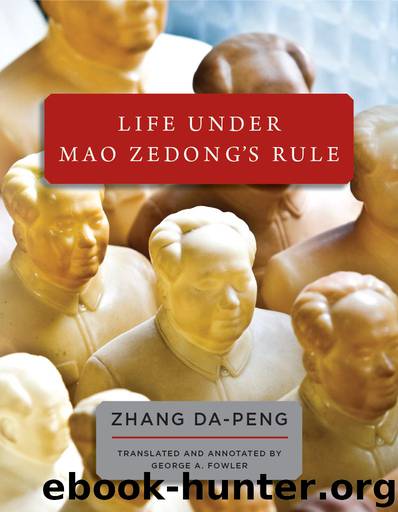Life Under Mao Zedong's Rule by Da-Peng Zhang

Author:Da-Peng Zhang [Zhang, Da-Peng]
Language: eng
Format: epub
Publisher: CreateSpace Independent Publishing Platform
Published: 2013-07-04T18:30:00+00:00
Chapter Two
Big Trouble for Old Granny Wang
after Cutting Up the
Leader’s Picture
Xiaoping finished reading Hai Rui Dismissed from Office and Notes from Three-Family Village, both lent to him by Old Ding Weiyi. In the debate over Hai Rui Dismissed from Office, the criticizers gradually gained the upper hand. With tedious repetition, the Shanghai newspapers, Beijing’s People’s Daily, and the journal Red Flag published their damning articles. They said this play was a “big poisonous weed” of reaction whose core implied that “loyal officials get sacked,” or that, in the age-old tactic of oblique criticism, they “pointed at the mulberry tree while really scolding the locust tree.” Xiaoping naturally saw the connection between this and people dissatisfied with Marshal Peng Dehuai’s removal from office, with current public opinion out to crush such people. Yao Wenyuan, who wrote “Criticizing the New Historical Play Hai Rui Dismissed from Office,” had now become a figure so powerful that “if you stretched out your hand, you could feel his heat,” as his enemies said, and whose arrogance was now insufferable as he criticized first this and then that. A great many members of the literary world, and the cadres who supervised and controlled them, were now all being criticized. But there was one big difference between this campaign and all the previous ones. The targets of those earlier criticisms and struggle sessions had all been ordinary people. Very rarely had party cadres been criticized like this in the newspapers. But now it was different. The author himself of Hai Rui Dismissed from Office was the vice mayor of Beijing Municipality, and along with him were criticized many cadres of the cultural and propaganda departments of many ministries.
Xiaoping identified this as a struggle between different factions within the party. Even Chairman Mao said, “There are parties outside the party and factions within the party. It has always been like this.” Thus, he sensed a new campaign shaping up, but it would have nothing to do with the ordinary people. He even felt that, from his experience in 1960, 1961, and 1962, when high-level authorities have internal power struggles, they have no time to bother with struggling ordinary people. Between friends, between relatives, discussing such topics became more and more frequent, but no one could tell what it all meant.
Xiaoping still went once a week to his English teacher and to Uncle Hua. But ever since Uncle Hua had given him that fifty thousand yuan, the old man never again mentioned it. How Xiaoping had hidden the money was something Uncle Hua never asked. Xiaoping thought that perhaps Uncle Hua considered that money as now belonging to him and that to bring the subject up would show insincerity. This was the biggest reason. Sometimes he wondered if Uncle Hua had already “divined” where the money had been hidden and, being satisfied with how Xiaoping had dealt with this, he thus never brought the subject up. Whatever the case, Xiaoping had no way of knowing. In short, from that
Download
This site does not store any files on its server. We only index and link to content provided by other sites. Please contact the content providers to delete copyright contents if any and email us, we'll remove relevant links or contents immediately.
Becoming by Michelle Obama(10020)
Beartown by Fredrik Backman(5737)
The Last Black Unicorn by Tiffany Haddish(5629)
Man's Search for Meaning by Viktor Frankl(4580)
The Book of Joy by Dalai Lama(3972)
The Five People You Meet in Heaven by Mitch Albom(3554)
In a Sunburned Country by Bill Bryson(3536)
The Choice by Edith Eva Eger(3467)
Full Circle by Michael Palin(3443)
The Mamba Mentality by Kobe Bryant(3265)
The Social Psychology of Inequality by Unknown(3018)
Imagine Me by Tahereh Mafi(2935)
Book of Life by Deborah Harkness(2930)
The Checklist Manifesto by Atul Gawande(2844)
Less by Andrew Sean Greer(2688)
A Burst of Light by Audre Lorde(2597)
The Big Twitch by Sean Dooley(2430)
No Room for Small Dreams by Shimon Peres(2362)
Everest the Cruel Way by Joe Tasker(2338)
